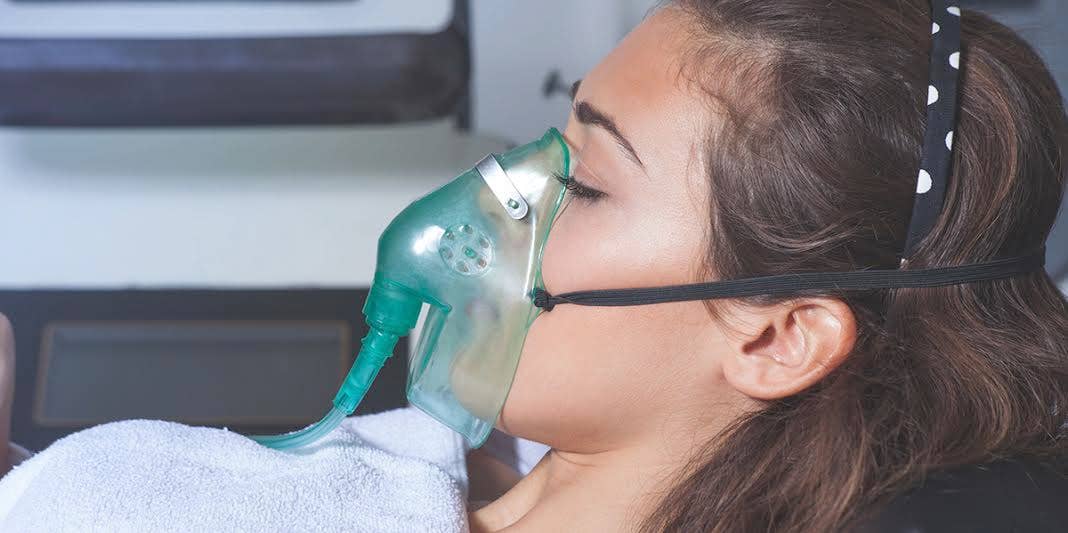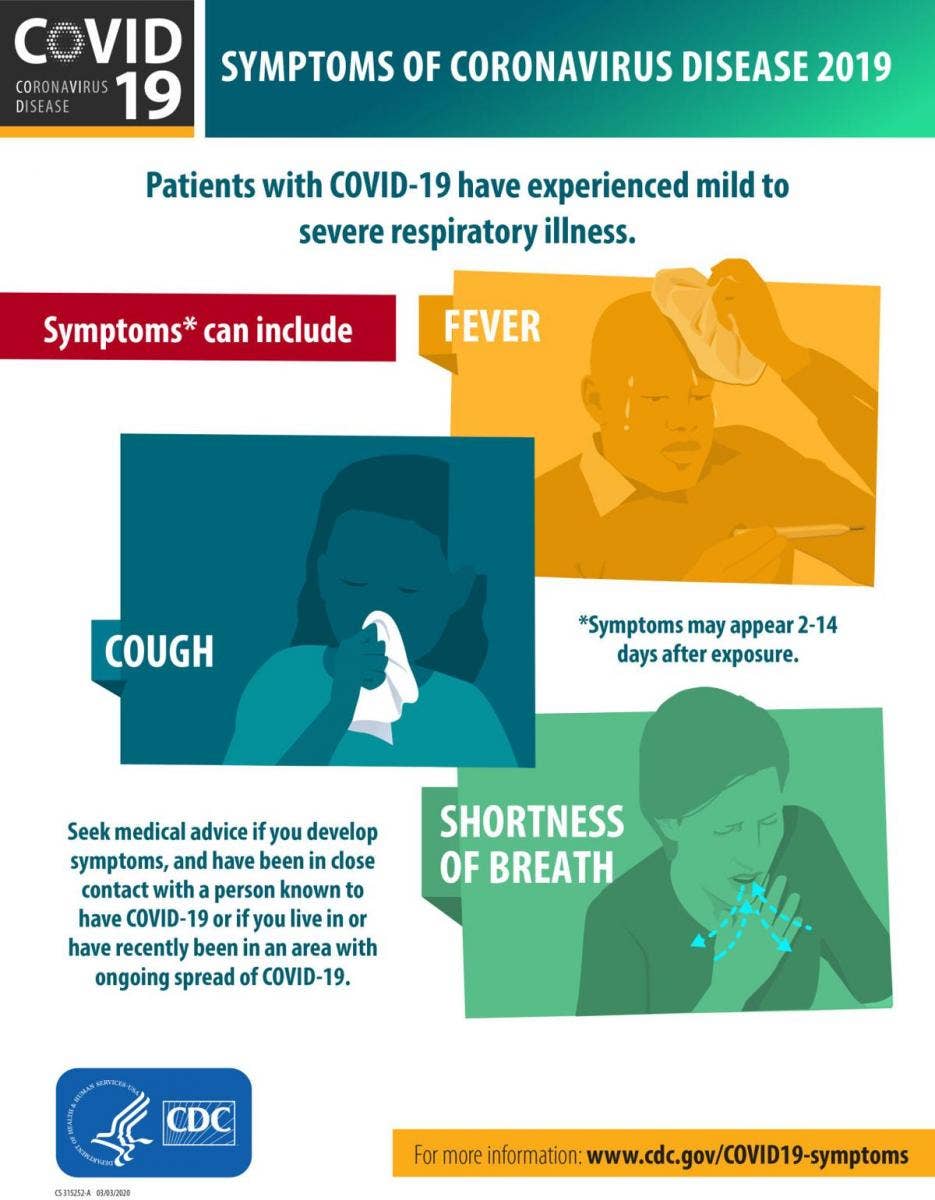What Is 'Happy Hypoxia'? The New Coronavirus Symptom That's Baffling Doctors
Normally hypoxia makes people very sick. But some COVID-19 patients tolerate the condition.
 Branislav Ostojic / 123RF
Branislav Ostojic / 123RF We have begun the third month of the coronavirus pandemic in the United States and science racing to catch up with the disease. As more people come to doctors for help with recovery, doctors are learning more and more about all the ways the virus affects the body.
We all know that COVID-19 causes fever, chills, body aches, and coughing, among other symptoms. But now doctors are identifying conditions that they didn't expect and don't fully understand. One such condition is something they're calling "happy hypoxia." Generally, hypoxia is what happens when the amount of oxygen in your body is too low. Patients usually feel terrible when this happens and it indicates an urgent need for medical attention. But some COVID-19 patients are showing up with dangerously low blood oxygen — but no external symptoms of the conditions.
What is happy hypoxia — and how can doctors treat it?
Keep reading for all the details.
What is happy hypoxia?
In simple terms, hypoxia means that your blood isn't carrying as much oxygen as it should. Typically, blood should have an oxygen saturation of about 95%. Anything below that is considered hypoxia. It happens when you aren't taking in enough oxygen or expelling enough carbon dioxide and your blood isn't able to get sufficient oxygen to the tissue in your body. There are a variety of reasons this can happen, such as high altitude, asthma, or heart disease. The symptoms of hypoxia include changes in the color of your skin (ranging from blue to cherry red), confusion, coughing, fast heart rate, rapid breathing, shortness of breath, slow heart rate, sweating, wheezing. Normally, if you have symptoms of hypoxia, you should seek medical attention immediately.

COVID-19 has some common symptoms.
Does COVID-19 cause hypoxia?
The short answer to that question is yes, it does. Doctors have reported seeing people with blood oxygen levels at alarmingly low levels — down as far as 50%. Normally, a patient in that condition would be in significant distress, possibly showing mental symptoms like confusion as well as physical symptoms like struggling to breathe. However, some COVID-19 patients are showing up for treatment with low blood oxygen but none of the symptoms doctors would expect. Doctors have reported patients coming for treatment for the disease and being able to talk coherently, sit up in bed, even scroll on their phones to pass the time. They call the condition "happy hypoxia," where patients feel fine despite their serious condition. “There is a mismatch [between] what we see on the monitor and what the patient looks like in front of us,” Dr. Reuben Strayer, an emergency physician at Maimonides Medical Center in Brooklyn, told reporters.
Doctors can't figure out why there are some people who have dangerously low blood oxygen levels from the illness but don't react as expected to the condition. The patients can progress to the respiratory distress that we have come to expect from COVID-19 but it doesn't follow the pattern doctors usually expect in breathing conditions.
Could happy hypoxia have to do with blood clotting?
One of the other recent discoveries about this disease is that it affects the way blood clots, causing an increase in clotting. This is also a dangerous situation since anything that affects blood circulation can cause major problems in the body. Broadway star Nick Cordero, who has been hospitalized for COVID-19 since March lost his leg after a clot damaged the tissue beyond repair. Other patients have had strokes due to COVID-19 clotting problems.
Now doctors speculate that the hypoxia is caused by a clotting process in the lungs. Dr. Strayer hypothesized that hypoxia starts because “small blood vessels of the lung are being showered with clots.” But doctors aren't willing to say for sure that clotting is connected to the phenomenon of happy hypoxia.
How can doctors treat hypoxia?
Typically, when a person is presenting low oxygen saturation, the solution is to introduce oxygen. This is why you'll hear about mountain climbers using supplemental oxygen to stay healthy at high altitudes. For COVID-19 patients, doctors have been using several strategies. Different methods of providing oxygen include masks, cannulas, ventilators and respirators. They can turn up the amount of oxygen being mechanically given to the patients to try and get their levels up to where they should be.
Other strategies go along with all the oxygen therapies, such as turning patients on to their stomachs. This is a well-known method of getting patients on ventilators to improve lower-lung function and some doctors are seeing it, combined with oxygen via nasal cannula, as a good tactic for COVID-19 patients — at least initially.
Blood thinners might also help.
The clotting issue that doctors are seeing is something that needs to be treated even if it isn't the cause of hypoxia in patients. Elnara Marcia Negri, a pulmonologist at Hospital Sírio-Libanês in São Paulo told reporters that has been treating some hospitalized patients with a common blood thinner called heparin to see if that improves their outcomes. Her initial findings show that patients seem to recover somewhat better with heparin. She is planning to continue the course of treatment with additional patients to see if the results can be replicated.
What about pulse oximetry?
You may have heard that you should buy a pulse oximeter to monitor your own blood oxygen levels if you get sick. These finger-tip devices are readily available at drugstores and can be useful tools. However, doctors caution that people shouldn't use them to diagnose themselves on their own. The best bet is to use the device in conjunction with consulting your doctor via telemedicine. Your doctor can use the data to help decide if you need to seek treatment or not.
This disease remains incredibly confusing to doctors and patients alike. For the moment, the best recommendation continues to be to maintain social distancing, wash your hands frequently, and call your doctor if you think you might be sick.
Rebekah Kuschmider has been writing about celebrities, pop culture, entertainment, and politics since 2010. She is the creator of the blog FeminXer and she is a cohost of the weekly podcast The More Perfect Union.

